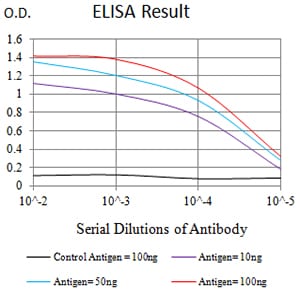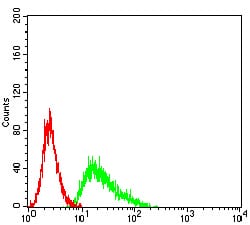

| WB | 咨询技术 | Human,Mouse,Rat |
| IF | 咨询技术 | Human,Mouse,Rat |
| IHC | 咨询技术 | Human,Mouse,Rat |
| ICC | 技术咨询 | Human,Mouse,Rat |
| FCM | 1/200 - 1/400 | Human,Mouse,Rat |
| Elisa | 1/10000 | Human,Mouse,Rat |
| Aliases | TNFRSF9; ILA; 4-1BB; CDw137 |
| Entrez GeneID | 3604 |
| clone | 4G10B9 |
| WB Predicted band size | 27.9kDa |
| Host/Isotype | Mouse IgG1 |
| Antibody Type | Primary antibody |
| Storage | Store at 4°C short term. Aliquot and store at -20°C long term. Avoid freeze/thaw cycles. |
| Species Reactivity | Human |
| Immunogen | Purified recombinant fragment of human CD137 (AA: extra 24-186) expressed in E. Coli. |
| Formulation | Purified antibody in PBS with 0.05% sodium azide |
+ +
以下是关于CD137抗体的3篇代表性文献,涵盖基础机制、临床前及临床研究:
---
1. **文献名称**:*Agonistic anti-CD137 antibodies in cancer immunotherapy*
**作者**:Melero, I. et al.
**摘要**:该综述总结了CD137(4-1BB)作为共刺激受体在T细胞激活中的作用,强调其激动性抗体在增强抗肿瘤免疫应答中的潜力。临床前研究表明,抗CD137单抗可促进T细胞增殖、细胞因子分泌及肿瘤消退,但也可能引发肝毒性等副作用。
2. **文献名称**:*Phase I study of single-agent utomilumab (PF-05082566), a 4-1BB/CD137 agonist, in patients with advanced cancer*
**作者**:Tolcher, A.W. et al.
**摘要**:这项I期临床试验评估了抗CD137抗体Utomilumab的安全性及初步疗效。结果显示,单药治疗在晚期实体瘤患者中耐受性良好,但疗效有限,提示未来需探索与其他免疫检查点抑制剂(如抗PD-1)的联合策略。
3. **文献名称**:*A tetravalent anti-CD137 antibody promotes antitumor immunity via ER/phagocytosis-driven T cell activation*
**作者**:Du, X. et al.
**摘要**:该研究设计了一种四价结构的抗CD137抗体,通过增强受体交联和下游信号激活,显著提高了抗肿瘤效果。在小鼠模型中,该抗体通过促进巨噬细胞介导的T细胞活化,抑制肿瘤生长且减少肝毒性风险。
---
这些文献反映了CD137抗体从机制探索到临床转化的关键进展,包括单药局限性、联合治疗潜力及新型抗体工程优化策略。
CD137 (4-1BB), a member of the tumor necrosis factor receptor (TNFR) superfamily, is a co-stimulatory immune checkpoint molecule primarily expressed on activated T cells, natural killer (NK) cells, and dendritic cells. Its activation via binding to CD137 ligand (CD137L) triggers downstream signaling pathways (e.g., NF-κB), enhancing T-cell proliferation, survival, and effector functions while inhibiting apoptosis. This mechanism positions CD137 as a promising target for cancer immunotherapy, particularly in overcoming T-cell exhaustion in the tumor microenvironment.
Agonistic CD137 antibodies, designed to mimic ligand-induced activation, emerged as a strategy to amplify antitumor immunity. Preclinical studies demonstrated potent tumor regression in murine models, sparking clinical interest. Early trials, however, revealed dose-limiting toxicities, including hepatotoxicity, linked to excessive immune activation. For example, urelumab (anti-CD137 mAb) showed efficacy in melanoma and lymphoma but faced safety challenges, while utomilumab, a weaker agonist, exhibited better tolerability but modest clinical activity. These findings underscored the delicate balance between immune stimulation and systemic toxicity.
Current research focuses on optimizing CD137 targeting through bispecific antibodies, combination therapies (e.g., with PD-1/PD-L1 inhibitors), and localized delivery to minimize off-target effects. CD137 antibodies also hold potential in infectious disease and vaccine adjuvants. Despite challenges, their ability to reinvigorate antitumor immunity continues to drive innovation in next-generation immunotherapies.
×